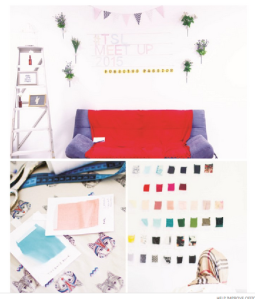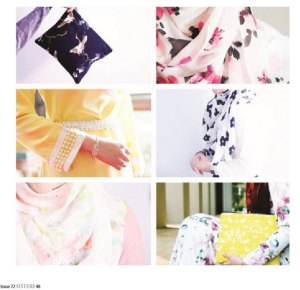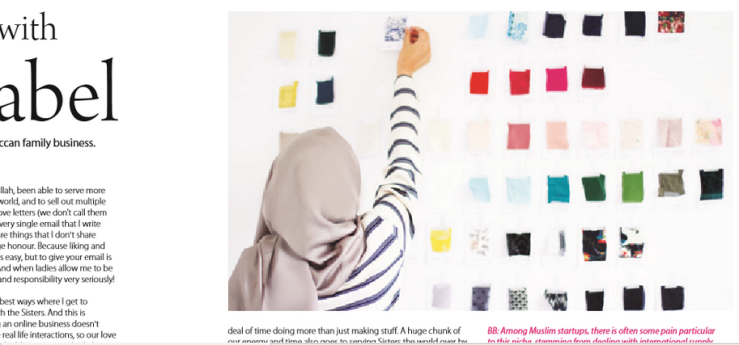For the October issue of SISTERS Magazine Aida Azlin explained to me how “It’s all about Sisterhood” with her fresh and exciting clothing (and tech stuff!) business.
Brooke Benoit: The idea of entrepreneurship can be really terrifying. At what point did you know that this was your path? And how did you prepare yourself to walk it?
Aida Azlin: I don’t think there is any perfect formula that will ever prepare you to walk on the path of entrepreneurship! I’ve always thought that I was an “accidental entrepreneur” because I never really set out to be one. But I now realise that there are no accidents in life, as everything is beautifully and perfectly planned by Allah.
Early in our marriage, when my husband and I were seriously considering moving back to Morocco, my husband asked me, “What do you want to do when you are back in Morocco, Aida?” I remember telling him that I really wanted to learn how to quilt and sew. I wanted to source for fabrics and just spend my days working with my hands. My husband was the one who suggested to me that “You should really consider selling shawls. Everyone wears them anyway!”
To be honest, I was very, very, very, very hesitant about it. I felt that there were already too many shawl sellers out there, and they were all doing a brilliant job. But I contemplated the idea for a while, never quite dismissing it completely nor embracing it fully.
When we got to Morocco, that’s when my perspective changed. It’s true what they say – the space that you are in can really inspire you and change the way you see things. I saw how “entrepreneurship” was so common in Morocco – almost everyone I know here has a small shop or trade, selling or offering some product or service. But there are no fancy labels like “startups” or “entrepreneurship” – people just do what they know how, and this taught me something valuable: that being an entrepreneur is far from just having website launches, or flashy marketing gimmicks, but truly, it’s about human interactions, trust, giving your best in the product you are selling and standing by your word. It’s also about working hard and starting with what you already have.
 BB: Almost everything on your website is sold out (masha Allah)! To get first dibs on monthly new releases, sisters must subscribe to your newsletter. Why are you operating like this – staying small – since you obviously have a bigger demand?
BB: Almost everything on your website is sold out (masha Allah)! To get first dibs on monthly new releases, sisters must subscribe to your newsletter. Why are you operating like this – staying small – since you obviously have a bigger demand?
AA: When I first started The Shawl Label (TSL) my niyyah (intention) was to always serve the sisters first (and still is). Profit is always secondary. By focusing on serving and prioritising the ladies on our mailing list, we have, alhamdulillah, been able to serve more than 3000 sisters from around the world, and to sell out multiple times. When ladies sign up to our love letters (we don’t call them newsletters, because I really treat every single email that I write to them as a love letter, where I share things that I don’t share anywhere else), I treat that as a huge honour. Because liking and following a brand on social media is easy, but to give your email is another commitment altogether! And when ladies allow me to be in their Inbox, I treat that privilege and responsibility very seriously!
The love letters are also one of the best ways where I get to connect on a one-on-one basis with the Sisters. And this is extremely important to me. Having an online business doesn’t really give us much chance to have real life interactions, so our love letters allow me to not only share valuable content to the ladies, but to also build trust and build solid friendships. Alhamdulillah, I’ve been blessed to have many of my “customers” now as friends (a perk of the job, really!).
I also have a strong belief that I’d rather have a small group of people loving us than a massive group of people just merely liking us. So to me, it has never been and will never be about numbers. I’d rather “stay small” and continue building a solid community of Sisters than go big and miss out on all the interactions.
 BB: Building a brand feels intimidating and like top secret stuff that only a few have access to know-how and master. How are you approaching building the TSL brand? Any secrets?
BB: Building a brand feels intimidating and like top secret stuff that only a few have access to know-how and master. How are you approaching building the TSL brand? Any secrets?
AA: There are no secrets! It’s all about authenticity. When you are not being authentic and honest, people know. And it’s a turn off, really! Consumers are getting smarter, and people can see right through the fancy schmancy marketing gimmicks/trends. I mean, amazing design and good copy always helps (they are the silent ambassadors of your brand) but at the end of the day, stellar customer service, authenticity and constantly providing real value to your audience definitely sets you apart, insha Allah.
BB: How do you describe TSL’s style? How might your brand be different from other hijab shops/designers?
AA: I’ve strived from the beginning for TSL to be more than just a hijab shop. We focus on making our shawls here in our small little studio in Tangier, and we pride ourselves in creating other purposeful, beautiful products as well, but we also spend a great deal of time doing more than just making stuff. A huge chunk of our energy and time also goes to serving Sisters the world over by equipping and empowering them with the tools to strive for self-betterment, insha Allah. This is done through our TSL Classes / TSL Meet-Ups and every single content we put out there through our social media and especially through ourLove Letters.
Our primary focus has always been the Sisters, not the products per-se. Even if one day we stop making shawls, I will still continue to find a way to serve ladies. I believe that this is my one sole purpose in life, to serve Allah through serving my Sisters. And if selling and making shawls is one of the ways I can do that, then that I will do so with heart and sincerity.
If one day, He wills that I have to stop selling shawls, and make shoes, perhaps – then my approach will still be the same. Sisters first, shoes second.
BB: How did your recent Photoshop workshop go and are you offering it again?
AA: Masha Allah it went waaaay better than what we expected, alhamdulillah! We had Sisters from all over (Singapore, UK, Brunei, Malaysia, Nigeria, Netherlands, US) signed up and it made me feel dizzy with happiness that I am able to share a valuable skill with them. We also have a secret FB Group where all the Sisters post their works, and whenever I see them interacting, posting the art prints they learned to make themselves – my heart swells. I feel like a proud mother, basically!
We have been getting emails to re-open it again, so insha Allah, we will launch it again in November.
BB: Among Muslim startups, there is often some pain particular to this niche, stemming from dealing with international supply companies as well as having customers around the globe, so there are plenty of legal and logistical issues. There are also a lot of different work ethics or lack thereof. Have you found ways to circumvent these problems?
AA: There is no one way to ensure everything runs smoothly, except with a lot of du’a and tawakkul! There was a whole bunch of logistical issues we had to figure out earlier on, which alhamdulillah we have managed to overcome (after lots and lots of du’a!). But the one thing that really helped us out was having solid, reliable and amazing team partners that both understand and believe in our vision. We met many not-so-amazing tailors, vendors and suppliers, but again, with lots and lots of du’a and tawakkul, Allah has also placed in our paths some ‘masha Allah’ individuals as well!
BB: Your main TSL teammate is also your husband, Karim aka K. Spouse co-owned businesses can be extra stressful. How are you two balancing the lines of communication and control in TSL?
AA: Karim is a silent partner in TSL – it actually works pretty seamlessly as we both have very distinct skill sets and strengths. And to be honest, it is working pretty well as it allows me to focus on serving the ladies while he busies himself with the financials and anything and everything marketing related (which are two areas I absolutely hate!) The thing that helped us immensely is that we are both on the same page about where we see TSL in the future, the direction we are heading towards and the ultimate goal (which is to always, always serve the Sisters first). Whenever we get lost or overwhelmed, we always go back to our niyyah (intentions).
I also cannot stress how important it is to listen to each other, to be compassionate and to always, always have each other’s back. Our marriage is the most important to us, so no matter what happens in the business, we always remind each other that we are husband and wife first.
Also, it is imperative to have personal space. My husband and I work separately – me in my studio and him in any local cafe he feels like going to that day – and we always come back to have lunch and/or dinner together. But that few hours on our own really helps us be more productive and gives us a chance to miss each other, lol!
BB: Please explain your small, sustainable business approach – how are you sourcing and hiring, and when people buy TSL products, who are they paying?
AA: We have a small team here in Tangier, with one regular tailor, Sis Sanae (whom I love and adore to bits) and we also have a few packing fairies in Singapore who makes sure all our shawls/orders get sent out to our ladies, all beautifully and promptly packed. We do everything in-house – design, manufacturing, packaging – everything! When you buy something from us, you are not just purchasing a TSL Shawl, you are supporting Sisters both in Singapore and Morocco to live and pursue their dreams. You are supporting a Sisterhood.
To receive a Love Letter from Aida and learn more about her “Big on Sisterhood” business, visit the TSL website: theshawllabel.com
Brooke Benoit is a SISTERS editor and family business-runner living in Morocco with her food-artist husband and seven unschooled children.


















